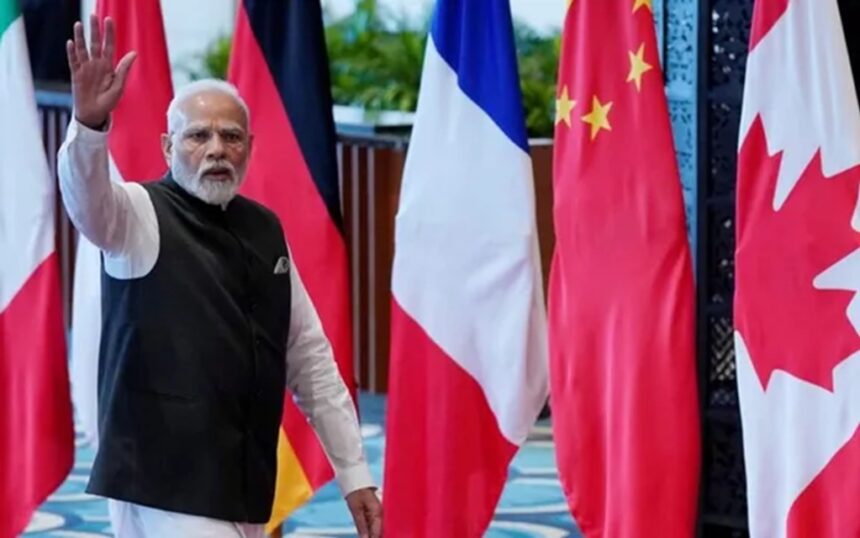NEW DELHI – India’s Prime Minister Narendra Modi’s expected visit to the G7 Summit in Kananaskis, Canada, has stirred strong debate in political and diplomatic circles. This move comes despite ongoing tensions between Ottawa and New Delhi, especially following the fallout from the killing of Sikh leader Hardeep Singh Nijjar in Canada.
The invitation to Modi, sent by newly elected Canadian Prime Minister Mark Carney, hints at a possible, if cautious, improvement in a relationship that has seen little warmth since the incident.
For India, receiving an invite to the G7 is a big win. While not a member, India has been included in the G7’s “outreach” sessions since 2019, highlighting its growing role in global affairs and the world economy.
Modi’s regular attendance at these meetings reflects India’s goal to be seen as a key player in discussions on the economy, climate, and security. After his congratulatory call to Carney on his election, Modi accepted the invitation to attend, speaking of a “renewed vigour, guided by mutual respect and shared interests” between both democracies.
Still, the Nijjar case casts a long shadow. Nijjar, a Sikh leader and advocate for Khalistan, was shot dead in Surrey, British Columbia, in June 2023. Former Prime Minister Justin Trudeau accused Indian government agents of being involved, an accusation India strongly denied and called “absurd” and “motivated”. The dispute led to both countries expelling diplomats and saw relations hit a new low.
Canada’s Sikh community
Canada, under its previous government, claimed to have “credible intelligence” linking the Indian government to Nijjar’s murder. The Royal Canadian Mounted Police later arrested four Indian nationals, charging them with first-degree murder and conspiracy. As the case works through the courts, it continues to attract public attention and spark anger, especially among Canada’s Sikh community.
Carney’s decision to invite Modi to the G7, despite the unresolved Nijjar investigation, has been heavily debated in Canada. Critics, including members of the Sikh community and opposition parties, see the move as a “betrayal” and an insult to Sikh Canadians, saying that justice for Nijjar should be the priority.
Carney responded by stressing Canada’s respect for the rule of law and said he would not comment on an ongoing legal case. He also pointed to India’s role in the global economy and supply chains as a reason why its presence at the G7 matters for global peace, security, and economic talks.
For India, the summit is a chance to meet world leaders and take part in key discussions. It also offers an opportunity to challenge the narrative surrounding the Nijjar case.
India has denied any involvement, and a Canadian commission report in January 2025 said that while there were disinformation campaigns after Trudeau’s allegations, “no definitive link to a foreign state could be proven” in Nijjar’s death. India has used this finding to support its position, even though it is not a complete clearance.
The Nijjar case has affected almost every part of Canada-India relations. Trade talks, once close to a deal, stalled in August 2023. While some business ties have held up despite political strain, mistrust remains.
Chilling of India-Canada Dispute
India has long seen Canada as a safe place for pro-Khalistan groups, which it considers a threat to its security.
Carney’s rise to power after Trudeau has led some to hope for a new beginning between the two countries. New Delhi hopes the new Canadian government will be more thoughtful in its approach. The G7 invitation might be a first step, sending a signal that both sides are open to talking and rebuilding cooperation, including on security issues.
Still, rebuilding trust will take more than handshakes at a summit. Both sides face pressure at home. Canada must listen to its Sikh communities and stand by its legal system. India, on the other hand, wants action against groups it sees as extremist and hopes for more serious engagement from Canada.
As Modi prepares to join the G7 in Kananaskis, the world’s attention will be on the summit. His participation highlights India’s rising profile, but also the deep tensions that remain unresolved. The meeting could open a door to new talks, but true improvement in Canada-India ties is likely to take time and effort from both sides.














